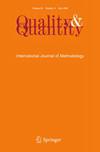Multiple systems estimation for studying over-coverage and its heterogeneity in population registers
Q1 Mathematics
引用次数: 0
Abstract
Abstract The growing necessity for evidence-based policy built on rigorous research has never been greater. However, the ability of researchers to provide such evidence is invariably tied to the availability of high-quality data. Bias stemming from over-coverage in official population registers, i.e. resident individuals whose death or emigration is not registered, can lead to serious implications for policymaking and research. Using Swedish Population registers and the statistical framework of multiple systems estimation, we estimate the extent of over-coverage among foreign-born individuals’ resident in Sweden for the period 2003–2016. Our study reveals that, although over-coverage is low during this period in Sweden, we observed a distinct heterogeneity in over-coverage across various sub-populations, suggesting significant variations among them. We also evaluated the implications of omitting each of the considered registers on real data and simulated data, and highlight the potential bias introduced when the omitted register interacts with the included registers. Our paper underscores the broad applicability of multiple systems estimation in addressing and mitigating bias from over-coverage in scenarios involving incomplete but overlapping population registers.人口登记中过度覆盖及其异质性研究的多系统估计
建立在严谨研究基础上的循证政策的必要性从未如此强烈。然而,研究人员提供此类证据的能力总是与高质量数据的可用性联系在一起。官方人口登记册(即未登记死亡或移徙的居民个人)覆盖范围过广所产生的偏见可能对决策和研究产生严重影响。利用瑞典人口登记和多系统估计的统计框架,我们估计了2003-2016年期间在瑞典居住的外国出生个人的过度覆盖程度。我们的研究表明,尽管瑞典在这一时期的过度覆盖率很低,但我们观察到不同亚种群的过度覆盖率存在明显的异质性,表明它们之间存在显著差异。我们还评估了忽略每个考虑的寄存器对真实数据和模拟数据的影响,并强调了当忽略的寄存器与所包含的寄存器相互作用时引入的潜在偏差。我们的论文强调了在涉及不完整但重叠的人口登记的情况下,多系统估计在解决和减轻过度覆盖造成的偏见方面的广泛适用性。
本文章由计算机程序翻译,如有差异,请以英文原文为准。
求助全文
约1分钟内获得全文
求助全文
来源期刊

Quality & Quantity
管理科学-统计学与概率论
CiteScore
4.60
自引率
0.00%
发文量
276
审稿时长
4-8 weeks
期刊介绍:
Quality and Quantity constitutes a point of reference for European and non-European scholars to discuss instruments of methodology for more rigorous scientific results in the social sciences. In the era of biggish data, the journal also provides a publication venue for data scientists who are interested in proposing a new indicator to measure the latent aspects of social, cultural, and political events. Rather than leaning towards one specific methodological school, the journal publishes papers on a mixed method of quantitative and qualitative data. Furthermore, the journal’s key aim is to tackle some methodological pluralism across research cultures. In this context, the journal is open to papers addressing some general logic of empirical research and analysis of the validity and verification of social laws. Thus The journal accepts papers on science metrics and publication ethics and, their related issues affecting methodological practices among researchers.
Quality and Quantity is an interdisciplinary journal which systematically correlates disciplines such as data and information sciences with the other humanities and social sciences. The journal extends discussion of interesting contributions in methodology to scholars worldwide, to promote the scientific development of social research.
 求助内容:
求助内容: 应助结果提醒方式:
应助结果提醒方式:


